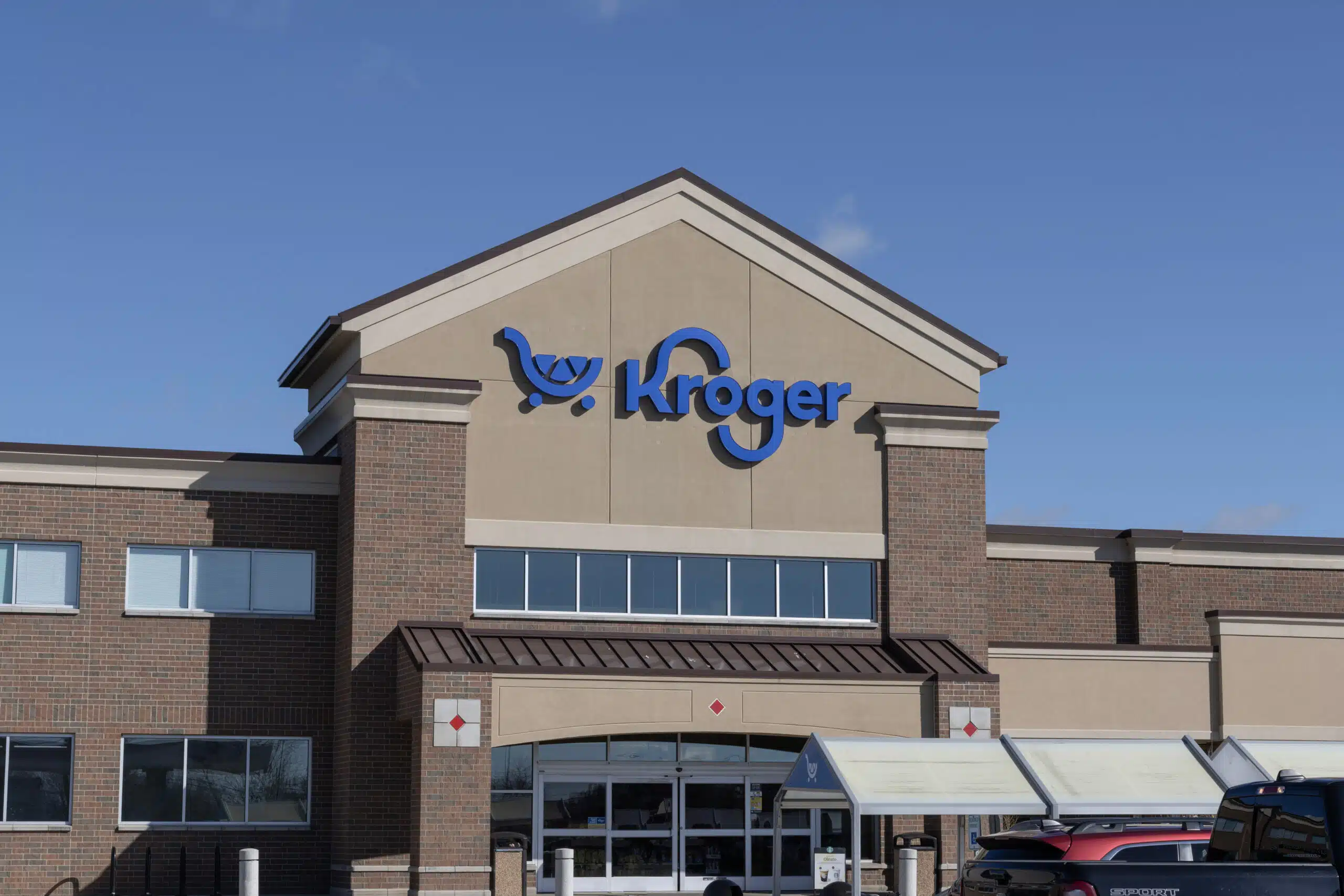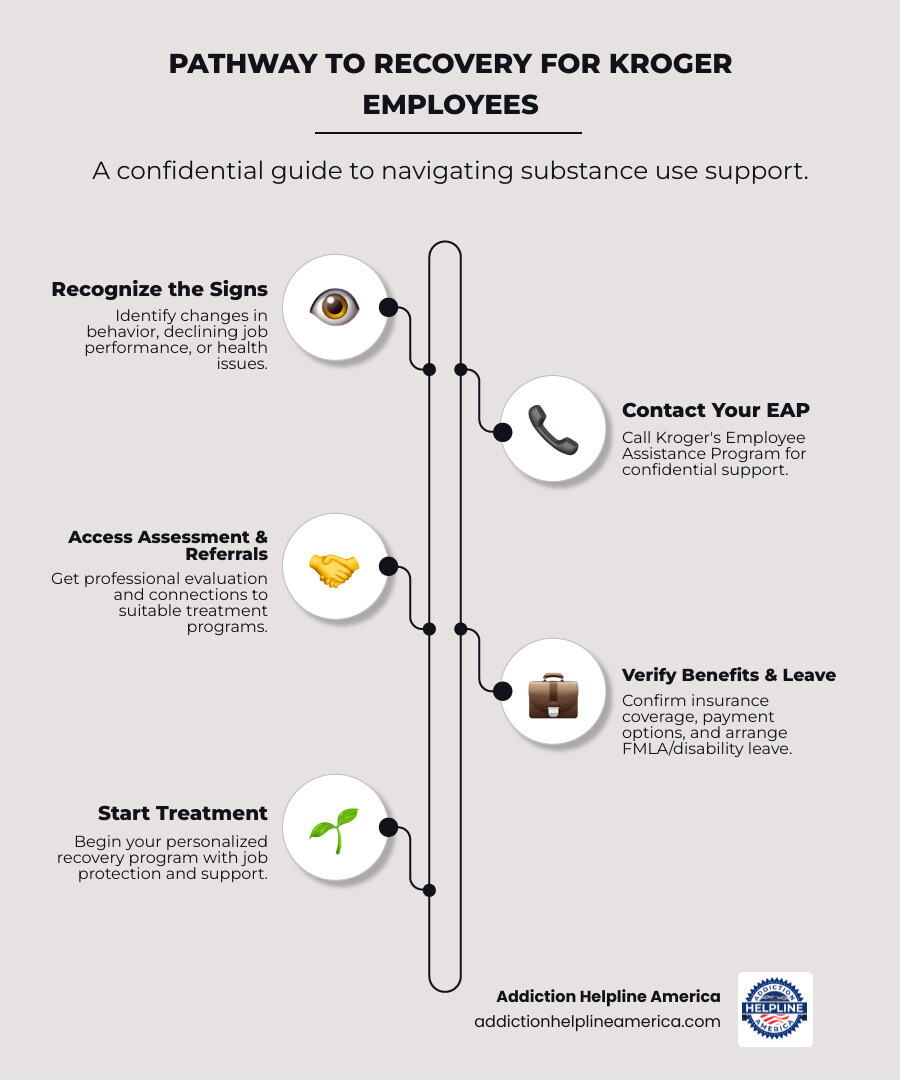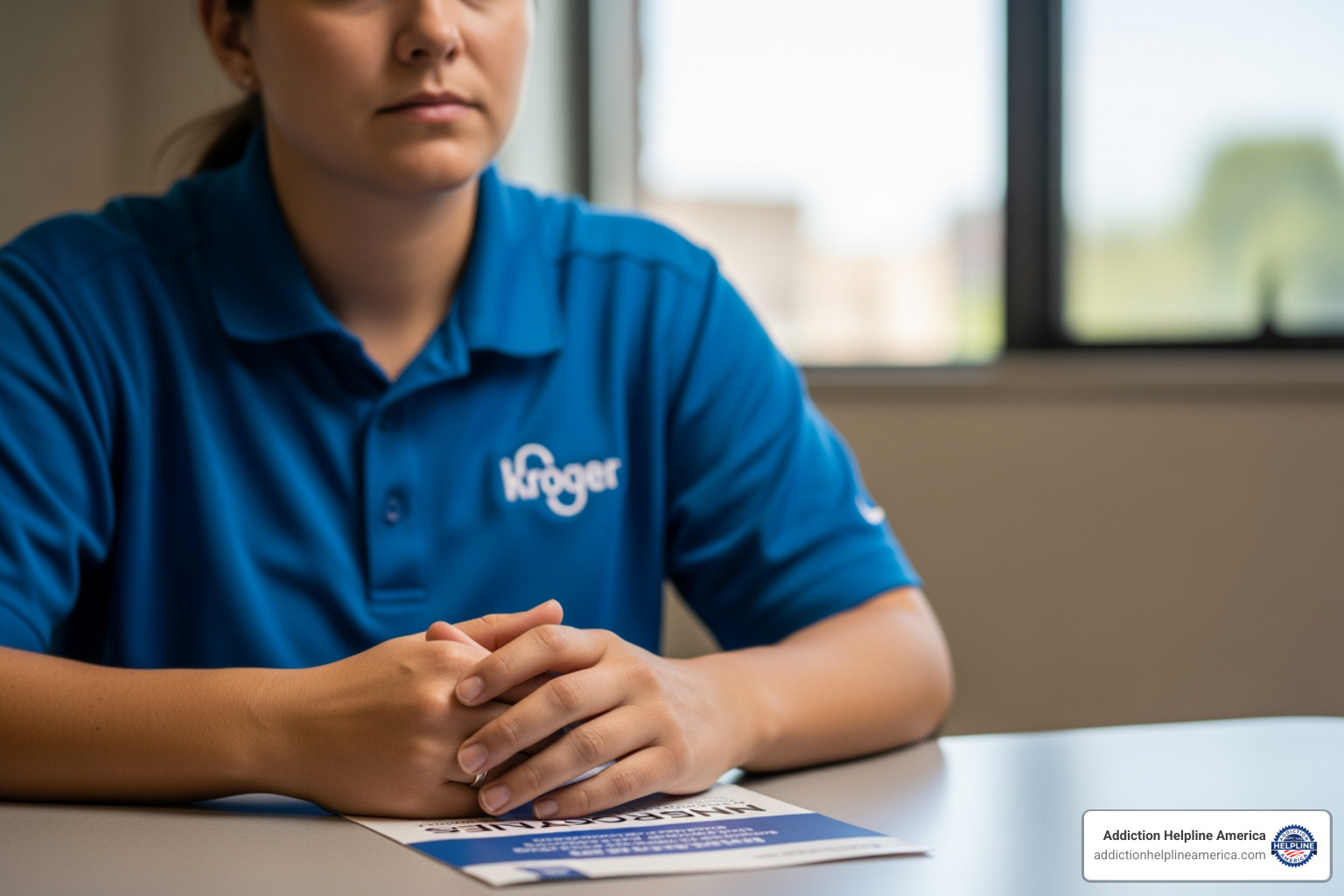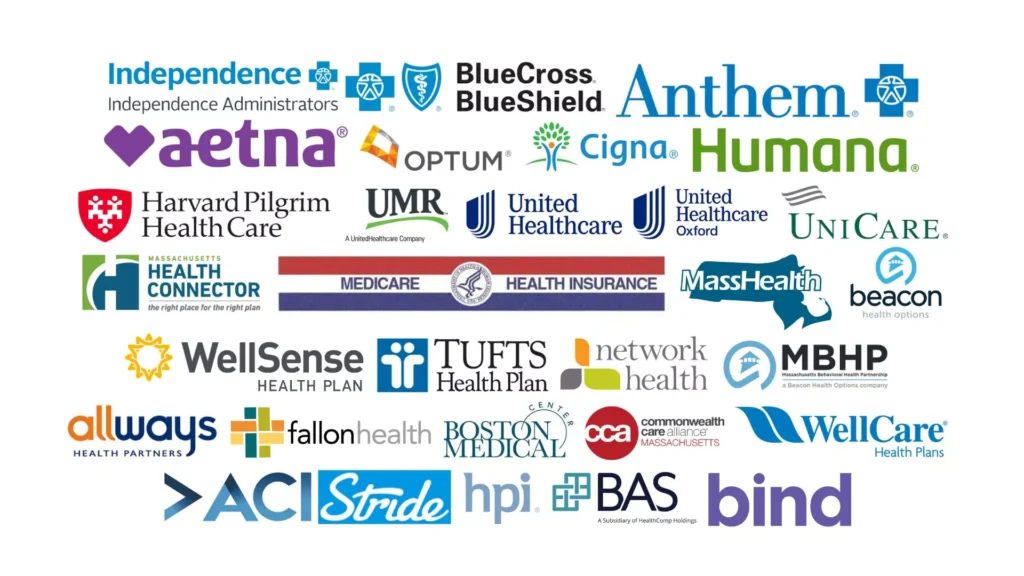
Why Understanding Your Options Matters When You’re Struggling
Drug & Alcohol Rehab for Kroger Employees is accessible through Employee Assistance Programs (EAPs), health insurance, and union benefits. Here are the key things to know:
Quick Facts:
- Kroger offers an EAP for confidential assessments, counseling, and referrals at no cost.
- Your job is protected by laws like FMLA and the ADA when you seek treatment for a substance use disorder.
- Treatment is confidential and your employer won’t be notified unless you request leave.
- Multiple treatment levels are available, including outpatient programs that allow you to continue working.
- Many Kroger health plans cover at least a portion of addiction treatment costs.
Retail work is demanding, and Kroger recognizes that “alcohol abuse, substance abuse, and addiction may arise out of treatable illnesses.” The company believes in early intervention and support to improve rehabilitation success.
If substance use is affecting your life, help is available. Understanding your options for treatment, job protection, and insurance is the first step. At Addiction Helpline America, we provide confidential, 24/7 support to help Kroger employees steer their benefits and find the right treatment. We understand the challenges retail workers face and can guide you toward recovery.

Understanding Kroger’s Policies on Drug and Alcohol Use
Kroger maintains a drug-free workplace policy to ensure safety, but it also acknowledges that addiction is a treatable illness. The company’s policy states that “early intervention and support improve the chances of successful rehabilitation,” offering a path to recovery for those who are struggling.
However, the rules are clear. Kroger prohibits the use, possession, or distribution of alcohol, illegal drugs, and non-prescribed controlled substances on company time or property. This includes medical marijuana, regardless of state laws. You also cannot report to work impaired by any substance, including prescription drugs that affect your ability to work safely. If you are taking such a medication, you must inform your supervisor.
Policy violations can lead to disciplinary action, including termination. But remember, Kroger’s stated goal is to support colleagues who need help. Proactively seeking Drug & Alcohol Rehab for Kroger Employees can provide a path forward that protects your health and career.

Kroger’s Drug Testing Procedures
Drug testing at Kroger can occur in several situations:
- Pre-employment: Applicants must pass a drug test to be hired.
- Random: Current employees may be subject to random testing to ensure ongoing workplace safety.
- Post-incident: Testing is common after a workplace accident to help determine contributing factors.
- Reasonable suspicion: If a supervisor observes signs of impairment (like slurred speech or erratic behavior), they may require a test.
Tests typically screen for substances like marijuana, cocaine, amphetamines, and opiates. If you’re concerned about detection times, our guide on How Long Does Heroin Stay In Your System offers more information.
Call Now – Your Journey to Recovery Begins Today!

Take the first step towards a healthier life! Call now to connect with our compassionate team and start your recovery journey today. Your path to healing awaits!
Our recovery specialists are available 24/7 to provide support, and all calls are confidential and free. Reach out anytime – we’re here to help!
Consequences of a Failed Drug Test
A failed drug test has serious consequences. For applicants, it usually means the job offer is withdrawn. For current employees, it can lead to suspension or termination.
However, termination is not always automatic. Because Kroger’s policy views addiction as a treatable illness, some employees may be offered a chance to enter a treatment program. This is where your rights under the Americans with Disabilities Act (ADA) become critical. The ADA may protect individuals with a diagnosed substance use disorder, provided they are not currently using illegal drugs and are actively seeking or have completed treatment.
This means that proactively seeking Drug & Alcohol Rehab for Kroger Employees before a crisis occurs can protect you from termination. While a failed test is serious, taking action to get help can open the door to recovery and career protection. To learn more, review the information at The ADA, addiction, recovery, and employment.
Your Resources: EAPs, Insurance, and Union Benefits
As a Kroger employee, you have several resources to make Drug & Alcohol Rehab for Kroger Employees affordable and accessible. These include the Employee Assistance Program (EAP), your health insurance plan, and potential union benefits. Understanding how to use these resources is key to getting the help you need while protecting your livelihood.

How to Use Kroger’s Employee Assistance Program (EAP)
Your first call should be to Kroger’s Employee Assistance Program (EAP). This free, confidential service is designed to help employees and their families with personal challenges, including substance abuse.
When you contact the EAP, a trained counselor will provide a confidential assessment, offer short-term counseling, and give you referrals to specialized treatment centers that fit your needs. The EAP is your guide to navigating the system. While it doesn’t typically pay for long-term rehab, it connects you to resources that do, like your insurance plan.
By law, your conversations with the EAP are confidential and cannot be shared with your employer without your written consent. You can find the EAP’s 24/7 contact number in your employee benefits information. For a deeper dive, our guide on Employee Assistance Programs (EAPs) for Drug and Alcohol Rehab explains the process in detail. The historical context of EAPs can be found in this research.
Verifying Your Insurance and Union Coverage for Rehab
After contacting the EAP, the next step is to determine how to pay for treatment. Most Kroger health plans, whether through the company or a union fund like the UFCW, offer some level of coverage for addiction treatment, including detox, inpatient, and outpatient care.
To verify your benefits:
- Call your insurance provider. The number is on your insurance card. Ask about coverage for inpatient and outpatient rehab, pre-authorization requirements, and your potential out-of-pocket costs (deductibles, copays).
- Ask about in-network providers. Using an in-network treatment center will significantly lower your costs.
- Contact your union representative if you are a union member. They can explain any additional benefits or specific procedures required by your union’s health and welfare fund, such as pre-approval for treatment.
This process can feel overwhelming, but you don’t have to do it alone. Many treatment centers have admissions staff who can verify your benefits for you. Our guide, Will My Insurance Cover Drug Rehab, offers more tips. For broader support, see our Mental Health Resources page. At Addiction Helpline America, we help people with this process every day.
Navigating Drug & Alcohol Rehab for Kroger Employees
Deciding to seek help is a brave first step. For Kroger employees, understanding how to access treatment while protecting your job is essential. The good news is that support systems and legal protections are in place to help you on your journey to recovery.

Signs You or a Coworker Might Need Help
Recognizing the need for help is the first hurdle. Substance use disorders often develop gradually. Look for these common signs in yourself or a coworker:
- Behavioral Changes: Increased irritability, mood swings, or secretiveness.
- Declining Performance: Missing deadlines, making unusual errors, or difficulty concentrating.
- Physical Signs: Persistent fatigue, changes in appearance, or unexplained weight changes.
- Increased Absenteeism: Frequent lateness, calling in sick, or leaving early.
- Social Withdrawal: Avoiding colleagues or team activities.
If these patterns seem familiar, it may be time to seek help. Our Addiction Help Online Complete Guide offers more information on recognizing these signs.
How to Maintain Your Job While Seeking Treatment
Many people fear losing their job if they go to rehab, but you have significant legal protections. Kroger’s policies are backed by federal laws like the Family and Medical Leave Act (FMLA), which provides eligible employees with up to 12 weeks of unpaid, job-protected leave for serious health conditions, including substance use treatment.
To be eligible for FMLA, you generally must have worked for Kroger for at least 12 months and 1,250 hours in the past year. In addition, short-term disability insurance may provide partial income while you are on leave. Not everyone needs to take a leave of absence; many employees successfully balance work and recovery by attending flexible outpatient programs. Our guide on Work Recovery Balance offers strategies for this, and you can compare options in our Inpatient vs Outpatient Rehab guide.
Is Confidentiality Guaranteed for Drug & Alcohol Rehab for Kroger Employees?
Yes, your privacy is strongly protected. Federal laws like HIPAA (Health Insurance Portability and Accountability Act) prevent treatment providers from sharing your health information with your employer without your written consent. Likewise, Kroger’s Employee Assistance Program (EAP) is completely confidential.
Your supervisor and HR department will not be notified that you are seeking help unless you choose to tell them, for instance, to request FMLA leave or workplace accommodations. Even then, you control how much detail is shared. Confidentiality is a cornerstone of the treatment process, allowing you to seek help without fear of reprisal.
Call Now – Your Journey to Recovery Begins Today!

Take the first step towards a healthier life! Call now to connect with our compassionate team and start your recovery journey today. Your path to healing awaits!
Our recovery specialists are available 24/7 to provide support, and all calls are confidential and free. Reach out anytime – we’re here to help!
Types of Addiction Treatment Available
Drug & Alcohol Rehab for Kroger Employees is not a one-size-fits-all solution. Multiple levels of care exist to meet you where you are, from intensive 24/7 support to flexible programs that let you keep working.
The path to recovery often begins with medical detox for safe, supervised withdrawal. From there, options include inpatient programs for immersive, round-the-clock care, or outpatient programs (like PHP and IOP) that offer flexibility for those needing to balance work and treatment. At the core of every program are therapy and counseling (individual, group, and family), Medication-Assisted Treatment (MAT) where appropriate, and aftercare planning to support long-term sobriety.

Levels of Care: From Detox to Aftercare
Understanding the continuum of care helps you know what to expect:
- Detoxification: The first step is often medically supervised detox to manage withdrawal symptoms safely. Learn more at our Detox Facilities guide.
- Inpatient/Residential Rehab: This involves living at a facility for 30-90 days, receiving intensive, 24/7 care in a trigger-free environment. See our Inpatient Rehab Guide for details.
- Outpatient Rehab (PHP/IOP): These programs provide structured treatment while you live at home, offering the flexibility to continue working. Our Intensive Outpatient Guide explains how they work.
- Sober Living Homes: These offer a supportive, substance-free environment to transition back to daily life.
- Aftercare: Long-term recovery is supported through ongoing therapy and support groups like Alcoholics Anonymous.
Specialized Treatment for Co-Occurring Disorders
Many people with a substance use disorder also face mental health challenges like depression or anxiety. This is known as a dual diagnosis or co-occurring disorder. The stress of retail work can sometimes worsen these conditions, making integrated care essential.
Effective treatment must address both the addiction and the mental health condition simultaneously. A dual diagnosis program combines psychotherapy, potential medication management, and specialized support groups to treat the whole person. This integrated approach leads to better outcomes and a stronger foundation for lasting recovery. Kroger Health itself promotes mental wellness, recognizing this important connection.
It’s crucial to find a facility that specializes in this type of care. Our guide to Rehab Centers for Co-Occurring Disorders can help you find the right fit, and our Mental Wellness Resources page offers additional support.
Frequently Asked Questions about Rehab for Kroger Employees
Taking the first step can be overwhelming. Here are concise answers to common questions from Kroger employees about seeking treatment.
Does Kroger offer employee assistance for rehab?
Yes. Kroger provides an Employee Assistance Program (EAP) that offers free, confidential assessments and referrals to treatment. This is your best first step. Additionally, your Kroger health plan or union benefits likely cover a portion of treatment costs. For more on EAPs, see our guide on Employee Assistance Programs (EAPs) for Drug and Alcohol Rehab.
Can I be fired for going to rehab as a Kroger employee?
Generally, no. If you proactively seek help for a diagnosed substance use disorder, federal laws like the Family and Medical Leave Act (FMLA) and the Americans with Disabilities Act (ADA) provide job protection. FMLA allows for job-protected leave to attend treatment. These protections apply when you follow proper procedures for requesting leave and do not protect against policy violations like using drugs at work. Learn more at The ADA, addiction, recovery, and employment.
How long does drug and alcohol rehab for Kroger employees usually last?
Treatment length is personalized based on your specific needs. Programs can range from short-term interventions, like those in our 14 Day Rehab Complete Guide, to longer-term stays of 30, 60, or 90+ days. Outpatient programs also offer flexible timelines. A clinical assessment will determine the right duration for you. Explore options like 60 Day Rehab Programs Near Me to see what’s available.
Call Now – Your Journey to Recovery Begins Today!

Take the first step towards a healthier life! Call now to connect with our compassionate team and start your recovery journey today. Your path to healing awaits!
Our recovery specialists are available 24/7 to provide support, and all calls are confidential and free. Reach out anytime – we’re here to help!
Take the First Step Towards Recovery Today
If you’re reading this, you’re ready for a change. Recovery is a journey, and you don’t have to take it alone. As a Kroger employee, you have access to confidential EAP services, insurance benefits, and legal protections to support you while you heal.
A healthier future is possible. Taking action is a sign of strength. At Addiction Helpline America, our mission is to connect you to the right treatment. We offer free, confidential, and personalized guidance to help you find a recovery program that fits your life, schedule, and insurance.
Our network covers every single state: Alabama, Alaska, Arizona, Arkansas, California, Colorado, Connecticut, Delaware, Florida, Georgia, Hawaii, Idaho, Illinois, Indiana, Iowa, Kansas, Kentucky, Louisiana, Maine, Maryland, Massachusetts, Michigan, Minnesota, Mississippi, Missouri, Montana, Nebraska, Nevada, New Hampshire, New Jersey, New Mexico, New York, North Carolina, North Dakota, Ohio, Oklahoma, Oregon, Pennsylvania, Rhode Island, South Carolina, South Dakota, Tennessee, Texas, Utah, Vermont, Virginia, Washington, West Virginia, Wisconsin, Wyoming, and the District of Columbia.
You’ve already taken the first step by learning about your options for Drug & Alcohol Rehab for Kroger Employees. Now, take the next one. We’re here 24/7 to listen without judgment and guide you toward the support you deserve. Reach out today.
Find your path to recovery with our complete guide to addiction treatment programs
Our helpline is 100%
free & confidential
If you or someone you care about is struggling with drug or alcohol addiction, we can help you explore your recovery options. Don’t face this challenge alone—seek support from us.
Programs
Resources
Will my insurance
cover addiction
treatment?
We're ready to help
Find the best
drug or alcohol treatment
center
Are you or a loved one struggling with addiction? Call today to speak to a treatment expert.















